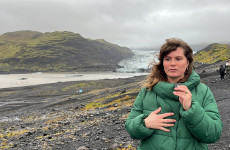Top Stories
Iceland’s Glaciers Melting Fast: Urgent Grief from Locals

UPDATE: Iceland’s glaciers are disappearing at an alarming rate, prompting emotional responses from locals and visitors alike. New reports confirm that the iconic Sólheimajökull Glacier has retreated by a staggering 2,000 meters over the last century, leaving behind a stark lake where ice once dominated the landscape.
“I’ve had some of the best times of my life exploring the glacier, but now it’s going away,” laments Esther Jónsdóttir, a writer and PhD student from Reykjavík. Her poignant reflections come amidst a conference of researchers and journalists visiting the glacier, underscoring the urgent reality of climate change.
The retreat of Sólheimajökull is not an isolated incident. Across Iceland, glaciers have decreased from approximately 12,600 square kilometers in 1880 to around 10,300 square kilometers in 2020, marking an 18% decline since pre-industrial times. The emotional weight of this loss resonates deeply with residents who have formed unique bonds with these majestic formations.
Dr. Thorvardur Arnason, a professor at the University of Iceland, shares his personal journey of witness to the glacier’s rapid decline. “What is worrying is that what we’re seeing in Iceland is happening also in Greenland and in glaciated regions all over the world,” he emphasizes. His ongoing photographic documentation reveals profound changes in the landscape, deepening his connection to the glaciers.
The melting glaciers are not just an aesthetic loss; they pose significant threats to global water supplies as they store about 70% of the world’s freshwater. As temperatures rise due to excessive greenhouse gas emissions, the risk of extreme weather events, including flooding, also escalates.
Conservationist Christopher Long, who moved to Iceland five years ago, describes glaciers as “entities” with their own energy. “People mourn the loss of glaciers as beings,” he states, highlighting the emotional toll of witnessing such environmental changes.
During the visit to Sólheimajökull, attendees felt a shared grief, likening the experience to visiting an old friend suffering from illness. Professor David Robbins of Dublin City University noted the powerful sense of loss felt by locals, reinforcing the human connection to the environment.
Despite the grim outlook, experts assert that it’s not too late to take action. Urgent collective efforts to reduce greenhouse gas emissions are necessary to mitigate further glacier loss and combat climate change’s broader impacts.
The recent declaration of the Okjökull Glacier as “dead” serves as a stark warning. In a 2019 ceremony, attendees, including former Irish President Mary Robinson, commemorated the loss, highlighting the urgency for future generations to act. The inscription on the commemorative plaque reads: “Only you know if we did it,” a challenge to current and future leaders.
As the world watches glaciers like Sólheimajökull vanish, the call to action grows louder. The emotional weight of these losses is felt not just in Iceland but globally, urging a united response to save what remains of these vital ice formations.
For updates on climate change and its impacts, stay tuned as this developing story unfolds. Share this article to raise awareness about the urgent plight of glaciers worldwide.
-

 Top Stories2 months ago
Top Stories2 months agoTributes Surge for 9-Year-Old Leon Briody After Cancer Battle
-

 Entertainment3 months ago
Entertainment3 months agoAimee Osbourne Joins Family for Emotional Tribute to Ozzy
-

 Politics3 months ago
Politics3 months agoDanny Healy-Rae Considers Complaint After Altercation with Garda
-

 Top Stories3 months ago
Top Stories3 months agoIreland Enjoys Summer Heat as Hurricane Erin Approaches Atlantic
-

 World4 months ago
World4 months agoHawaii Commemorates 80 Years Since Hiroshima Bombing with Ceremony
-

 Top Stories2 months ago
Top Stories2 months agoNewcastle West Woman Patricia Foley Found Safe After Urgent Search
-

 Top Stories4 months ago
Top Stories4 months agoFianna Fáil TDs Urgently Consider Maire Geoghegan-Quinn for Presidency
-

 World4 months ago
World4 months agoGaza Aid Distribution Tragedy: 20 Killed Amid Ongoing Violence
-

 World4 months ago
World4 months agoCouple Convicted of Murdering Two-Year-Old Grandson in Wales
-

 World4 months ago
World4 months agoAristocrat Constance Marten and Partner Convicted of Infant Murder
-

 Top Stories3 months ago
Top Stories3 months agoClimbing Errigal: A Must-Do Summer Adventure in Donegal
-

 Top Stories3 months ago
Top Stories3 months agoHike Donegal’s Errigal Mountain NOW for Unforgettable Summer Views








